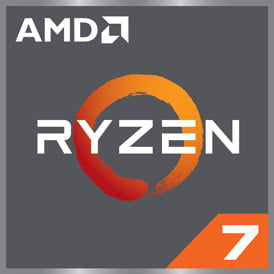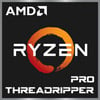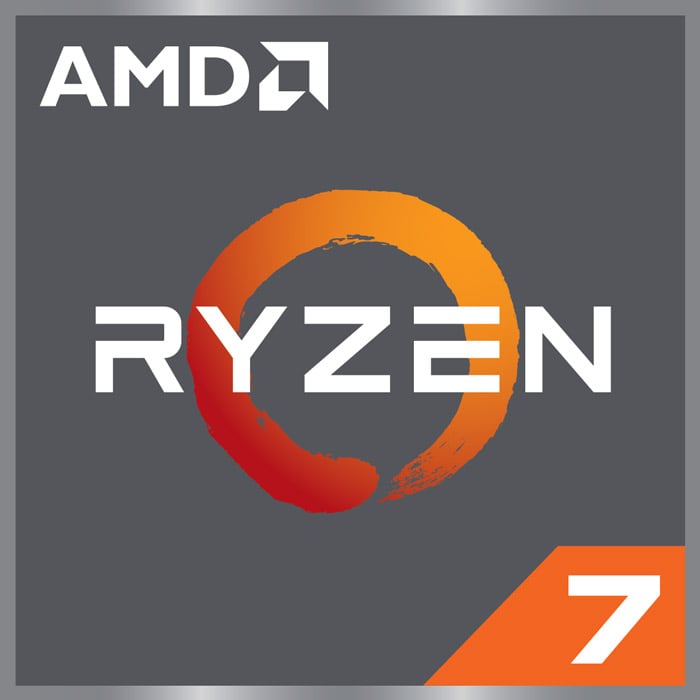
AMD Ryzen 7 5800X3D Benchmark, Test and specs
Last updated:
The AMD Ryzen 7 5800X3D has 8 cores with 16 threads and is based on the 4. gen of the AMD Ryzen 7 series. The processor uses a mainboard with the AM4 (PGA 1331) socket and was released in Q4/2020. The AMD Ryzen 7 5800X3D scores 1,679 points in the Geekbench 5 single-core benchmark. In the Geekbench 5 multi-core benchmark, the result is 12,024 points.

| Name: | AMD Ryzen 7 5800X3D |
|---|---|
| Family: | AMD Ryzen 7 (67) |
| CPU group: | AMD Ryzen 5000 (12) |
| Architecture: | Vermeer (Zen 3) |
| Segment: | Desktop / Server |
| Generation: | 4 |
| Predecessor: | -- |
| Successor: | AMD Ryzen 7 7800X3D |
CPU Cores and Base Frequency
The AMD Ryzen 7 5800X3D has 8 CPU cores and can calculate 16 threads in parallel. The clock frequency of the AMD Ryzen 7 5800X3D is 3.40 GHz (4.50 GHz). The number of CPU cores greatly affects the speed of the processor and is an important performance indicator.
| CPU Cores / Threads: | 8 / 16 |
|---|---|
| Core architecture: | normal |
| Cores: | 8x |
| Hyperthreading / SMT: | Yes |
|---|---|
| Overclocking: | No |
| Frequency: | 3.40 GHz |
| Turbo Frequency (1 Core): | 4.50 GHz |
| Turbo Frequency (8 Cores): | 4.20 GHz |
Memory & PCIeThe processor can use up to 128 GB memory in 2 (Dual Channel) memory channels. The maximum memory bandwidth is 51.2 GB/s. The memory type as well as the amount of memory can greatly affect the speed of the system. |
|
| Memory type: | Memory bandwidth: |
|---|---|
| DDR4-3200 | 51.2 GB/s |
| Max. Memory: | 128 GB |
| Memory channels: | 2 (Dual Channel) |
| ECC: | Yes |
| PCIe: | 4.0 x 20 |
| PCIe Bandwidth: | 39.4 GB/s |
Thermal ManagementThe thermal design power (TDP for short) of the processor is 105 W. The TDP specifies the necessary cooling solution that is required to cool the processor sufficiently. The TDP usually gives a rough idea of the actual power consumption of the CPU. |
|
|---|---|
| TDP (PL1 / PBP): | 105 W |
| TDP (PL2): | -- |
| TDP up: | -- |
| TDP down: | -- |
| Tjunction max.: | 90 °C |
Technical details
The AMD Ryzen 7 5800X3D is made in 7 nm. The smaller the manufacturing process of a CPU, the more modern and energy-efficient it is. Overall, the processor has 100.00 MB cache. A large cache can greatly speed up the processor's speed in some cases such as games.
| Technology: | 7 nm |
|---|---|
| Chip design: | Chiplet |
| Socket: | AM4 (PGA 1331) |
| L2-Cache: | 4.00 MB |
| L3-Cache: | 96.00 MB |
| AES-NI: | Yes |
| Operating systems: | Windows 10, Windows 11, Linux |
| Virtualization: | AMD-V, SVM |
|---|---|
| Instruction set (ISA): | x86-64 (64 bit) |
| ISA extensions: | SSE4a, SSE4.1, SSE4.2, AVX2, FMA3 |
| Release date: | Q4/2020 |
| Release price: | 449 $ |
| Part Number: | -- |
| Documents: | Technical data sheet |
Rate this processor
Benchmark results

The benchmark results for the AMD Ryzen 7 5800X3D have been carefully checked by us. We only publish benchmark results that have been created by us or that have been submitted by a visitor and then checked by a team member. All results are based on and fullfill our benchmark guidelines.
Screenshots:
Screenshots:
Cinebench 2024 (Single-Core)
The Cinebench 2024 benchmark is based on the Redshift rendering engine, which is also used in Maxon's 3D program Cinema 4D. The benchmark runs are each 10 minutes long to test whether the processor is limited by its heat generation.

|
AMD Ryzen 3 8300G
4C 8T @ 4.90 GHz |
||

|
AMD Ryzen 3 PRO 8300G
4C 8T @ 4.90 GHz |
||

|
Intel Core i5-12500
6C 12T @ 4.60 GHz |
||
|
|
AMD Ryzen 7 5800X3D
8C 16T @ 4.50 GHz |
||

|
AMD Ryzen 5 PRO 7645
6C 12T @ 5.10 GHz |
||

|
AMD Ryzen 5 7600
6C 12T @ 5.10 GHz |
||

|
AMD Ryzen 9 5950X
16C 32T @ 4.90 GHz |
||
Cinebench 2024 (Multi-Core)
The Multi-Core test of the Cinebench 2024 benchmark uses all cpu cores to render using the Redshift rendering engine, which is also used in Maxons Cinema 4D. The benchmark run is 10 minutes long to test whether the processor is limited by its heat generation.

|
Intel Core i5-13400F
10C 16T @ 4.60 GHz |
||

|
AMD Ryzen 5 7600
6C 12T @ 5.10 GHz |
||

|
AMD Ryzen 5 PRO 7645
6C 12T @ 5.10 GHz |
||
|
|
AMD Ryzen 7 5800X3D
8C 16T @ 4.50 GHz |
||

|
Intel Core i7-13700H
14C 20T @ 5.00 GHz |
||

|
Intel Core i5-13400E
10C 16T @ 4.60 GHz |
||

|
Intel Core i5-13400
10C 16T @ 4.60 GHz |
||
Cinebench R23 (Single-Core)
Cinebench R23 is the successor of Cinebench R20 and is also based on the Cinema 4 Suite. Cinema 4 is a worldwide used software to create 3D forms. The single-core test only uses one CPU core, the amount of cores or hyperthreading ability doesn't count.

|
AMD Ryzen 7 5800U
8C 16T @ 4.40 GHz |
||

|
AMD Ryzen 9 5900HS
8C 16T @ 4.60 GHz |
||

|
AMD Ryzen 9 5900HX
8C 16T @ 4.60 GHz |
||
|
|
AMD Ryzen 7 5800X3D
8C 16T @ 4.50 GHz |
||

|
AMD Ryzen 7 6800U
8C 16T @ 4.70 GHz |
||

|
AMD Ryzen 5 PRO 6650U
6C 12T @ 4.40 GHz |
||

|
AMD Ryzen 7 5825U
8C 16T @ 4.50 GHz |
||
Cinebench R23 (Multi-Core)
Cinebench R23 is the successor of Cinebench R20 and is also based on the Cinema 4 Suite. Cinema 4 is a worldwide used software to create 3D forms. The multi-core test involves all CPU cores and taks a big advantage of hyperthreading.

|
Intel Core i7-12700H
14C 20T @ 3.80 GHz |
||

|
AMD Ryzen 5 7600X
6C 12T @ 5.30 GHz |
||

|
AMD Ryzen 7 5800X
8C 16T @ 4.40 GHz |
||
|
|
AMD Ryzen 7 5800X3D
8C 16T @ 4.20 GHz |
||

|
Intel Core i5-13500H
12C 16T @ 4.40 GHz |
||

|
Apple M3 Pro (12-CPU 18-GPU)
12C 12T @ 3.80 GHz |
||

|
Intel Core i7-11700KF
8C 16T @ 4.50 GHz |
||
Geekbench 5, 64bit (Single-Core)
Geekbench 5 is a cross plattform benchmark that heavily uses the systems memory. A fast memory will push the result a lot. The single-core test only uses one CPU core, the amount of cores or hyperthreading ability doesn't count.

|
AMD Ryzen 9 5900
12C 24T @ 4.70 GHz |
||

|
Intel Core i3-12300T
4C 8T @ 4.20 GHz |
||

|
Intel Core i5-13450HX
10C 16T @ 4.60 GHz |
||
|
|
AMD Ryzen 7 5800X3D
8C 16T @ 4.50 GHz |
||

|
Intel Core i5-13420H
8C 12T @ 4.60 GHz |
||

|
Intel Core i5-12500H
12C 16T @ 4.50 GHz |
||

|
Intel Core i5-12500T
6C 12T @ 4.40 GHz |
||
Geekbench 5, 64bit (Multi-Core)
Geekbench 5 is a cross plattform benchmark that heavily uses the systems memory. A fast memory will push the result a lot. The multi-core test involves all CPU cores and taks a big advantage of hyperthreading.

|
AMD EPYC 7351P
16C 32T @ 2.90 GHz |
||

|
Intel Core i7-12700H
14C 20T @ 3.80 GHz |
||

|
Intel Core i7-12700HL
14C 20T @ 3.80 GHz |
||
|
|
AMD Ryzen 7 5800X3D
8C 16T @ 4.20 GHz |
||

|
Intel Xeon Gold 6138T
20C 40T @ 2.80 GHz |
||

|
Intel Core i5-12600KF
10C 16T @ 4.50 GHz |
||

|
Intel Core i5-12600K
10C 16T @ 4.50 GHz |
||
Geekbench 6 (Single-Core)
Geekbench 6 is a benchmark for modern computers, notebooks and smartphones. What is new is an optimized utilization of newer CPU architectures, e.g. based on the big.LITTLE concept and combining CPU cores of different sizes. The single-core benchmark only evaluates the performance of the fastest CPU core, the number of CPU cores in a processor is irrelevant here.

|
Intel Core i7-1260U
10C 12T @ 4.70 GHz |
||

|
AMD Ryzen 7 5700X
8C 16T @ 4.60 GHz |
||

|
AMD Ryzen 5 5600X
6C 12T @ 4.60 GHz |
||
|
|
AMD Ryzen 7 5800X3D
8C 16T @ 4.50 GHz |
||

|
Intel Core i3-1220P
10C 12T @ 4.40 GHz |
||

|
Intel Core i5-1240P
12C 16T @ 4.40 GHz |
||

|
Intel Core i5-1250P
12C 16T @ 4.40 GHz |
||
Geekbench 6 (Multi-Core)
Geekbench 6 is a benchmark for modern computers, notebooks and smartphones. What is new is an optimized utilization of newer CPU architectures, e.g. based on the big.LITTLE concept and combining CPU cores of different sizes. The multi-core benchmark evaluates the performance of all of the processor's CPU cores. Virtual thread improvements such as AMD SMT or Intel's Hyper-Threading have a positive impact on the benchmark result.

|
Intel Core i9-7980XE
18C 36T @ 3.50 GHz |
||

|
Intel Xeon W-3245
16C 32T @ 4.00 GHz |
||

|
AMD Ryzen 5 7500F
6C 12T @ 4.40 GHz |
||
|
|
AMD Ryzen 7 5800X3D
8C 16T @ 4.20 GHz |
||

|
AMD EPYC 7453
28C 56T @ 3.25 GHz |
||

|
AMD EPYC 7302P
16C 32T @ 3.20 GHz |
||

|
AMD Ryzen Threadripper PRO 3945WX
12C 24T @ 4.20 GHz |
||
Cinebench R20 (Single-Core)
Cinebench R20 is the successor of Cinebench R15 and is also based on the Cinema 4 Suite. Cinema 4 is a worldwide used software to create 3D forms. The single-core test only uses one CPU core, the amount of cores or hyperthreading ability doesn't count.

|
AMD Ryzen 7 5700G
8C 16T @ 4.60 GHz |
||

|
AMD Ryzen 7 6800H
8C 16T @ 4.70 GHz |
||

|
AMD Ryzen 7 PRO 6850H
8C 16T @ 4.70 GHz |
||
|
|
AMD Ryzen 7 5800X3D
8C 16T @ 4.50 GHz |
||

|
AMD Ryzen Threadripper PRO 5965WX
24C 48T @ 4.50 GHz |
||

|
AMD Ryzen Threadripper PRO 5945WX
12C 24T @ 4.50 GHz |
||

|
AMD Ryzen Threadripper PRO 5955WX
16C 32T @ 4.50 GHz |
||
Cinebench R20 (Multi-Core)
Cinebench R20 is the successor of Cinebench R15 and is also based on the Cinema 4 Suite. Cinema 4 is a worldwide used software to create 3D forms. The multi-core test involves all CPU cores and taks a big advantage of hyperthreading.

|
AMD Ryzen 5 7600
6C 12T @ 4.50 GHz |
||

|
AMD Ryzen 5 PRO 7645
6C 12T @ 4.50 GHz |
||

|
AMD Ryzen Threadripper 2920X
12C 24T @ 3.60 GHz |
||
|
|
AMD Ryzen 7 5800X3D
8C 16T @ 4.20 GHz |
||

|
AMD Ryzen 9 6980HS
8C 16T @ 4.20 GHz |
||

|
AMD Ryzen 9 6980HX
8C 16T @ 4.40 GHz |
||

|
Intel Xeon W-3235
12C 24T @ 4.00 GHz |
||
Blender 3.1 Benchmark
In the Blender Benchmark 3.1, the scenes "monster", "junkshop" and "classroom" are rendered and the time required by the system is measured. In our benchmark we test the CPU and not the graphics card. Blender 3.1 was presented as a standalone version in March 2022.

|
Intel Core i9-12900H
14C 20T @ 3.80 GHz |
||

|
Intel Core i5-12600K
10C 16T @ 4.50 GHz |
||

|
Intel Core i5-12600KF
10C 16T @ 4.50 GHz |
||
|
|
AMD Ryzen 7 5800X3D
8C 16T @ 4.20 GHz |
||

|
Intel Core i9-11900KF
8C 16T @ 4.80 GHz |
||

|
Intel Core i9-11900K
8C 16T @ 4.80 GHz |
||

|
Intel Core i9-10900KF
10C 20T @ 4.90 GHz |
||
Estimated results for PassMark CPU Mark
Some of the CPUs listed below have been benchmarked by CPU-monkey. However the majority of CPUs have not been tested and the results have been estimated by a CPU-monkey’s secret proprietary formula. As such they do not accurately reflect the actual Passmark CPU mark values and are not endorsed by PassMark Software Pty Ltd.

|
Intel Core i9-9940X
14C 28T @ 4.20 GHz |
||

|
AMD EPYC 7401P
24C 48T @ 2.80 GHz |
||

|
Intel Core i7-12700E
12C 20T @ 4.00 GHz |
||
|
|
AMD Ryzen 7 5800X3D
8C 16T @ 4.20 GHz |
||

|
AMD Ryzen 7 5800X
8C 16T @ 4.40 GHz |
||

|
Intel Xeon W-2275
14C 28T @ 4.00 GHz |
||

|
Intel Core i9-10940X
14C 28T @ 4.20 GHz |
||
Cinebench R15 (Single-Core)
Cinebench R15 is the successor of Cinebench 11.5 and is also based on the Cinema 4 Suite. Cinema 4 is a worldwide used software to create 3D forms. The single-core test only uses one CPU core, the amount of cores or hyperthreading ability doesn't count.

|
AMD Ryzen 9 6900HS
8C 16T @ 4.60 GHz |
||

|
Intel Core i3-13100
4C 8T @ 4.50 GHz |
||

|
AMD Ryzen 7 5700G
8C 16T @ 4.60 GHz |
||
|
|
AMD Ryzen 7 5800X3D
8C 16T @ 4.50 GHz |
||

|
AMD Ryzen 9 5980HS
8C 16T @ 4.80 GHz |
||

|
Intel Core i7-1255U
10C 12T @ 4.70 GHz |
||

|
Intel Core i5-11600KF
6C 12T @ 4.90 GHz |
||
Cinebench R15 (Multi-Core)
Cinebench R15 is the successor of Cinebench 11.5 and is also based on the Cinema 4 Suite. Cinema 4 is a worldwide used software to create 3D forms. The multi-core test involves all CPU cores and taks a big advantage of hyperthreading.

|
AMD Ryzen 5 7600X
6C 12T @ 5.30 GHz |
||

|
Intel Xeon W-2170B
14C 28T @ 3.60 GHz |
||

|
Intel Xeon W-2175
14C 28T @ 3.60 GHz |
||
|
|
AMD Ryzen 7 5800X3D
8C 16T @ 4.20 GHz |
||

|
Intel Core i9-7920X
12C 24T @ 3.70 GHz |
||

|
AMD Ryzen Threadripper 1920X
12C 24T @ 3.60 GHz |
||

|
Intel Xeon Gold 6146
12C 24T @ 3.60 GHz |
||
CPU performance per watt (efficiency)
Efficiency of the processor under full load in the Cinebench R23 (multi-core) benchmark. The benchmark result is divided by the average energy required (CPU package power in watts). The higher the value, the more efficient the CPU is under full load.

|
Intel Core i7-12700H
15,453 CB R23 MC @ 96 W |
||

|
Intel Core i7-14700K
33,572 CB R23 MC @ 209 W |
||

|
Intel Core i9-13900KS
40,837 CB R23 MC @ 257 W |
||
|
|
AMD Ryzen 7 5800X3D
15,125 CB R23 MC @ 96 W |
||

|
AMD Ryzen 9 7900X
29,306 CB R23 MC @ 186 W |
||

|
Intel Core i9-13900K
39,652 CB R23 MC @ 252 W |
||

|
Intel Core i9-13900KF
39,652 CB R23 MC @ 252 W |
||
Benchmarks

Cinebench 2024 (SC)
272 entries
272 entries

Cinebench 2024 (MC)
271 entries
271 entries

Cinebench R23 (SC)
586 entries
586 entries

Cinebench R23 (MC)
565 entries
565 entries

Geekbench 5 (SC)
2,488 entries
2,488 entries

Geekbench 5 (MC)
2,461 entries
2,461 entries

Geekbench 6 (SC)
1,754 entries
1,754 entries

Geekbench 6 (MC)
1,702 entries
1,702 entries

Cinebench R20 (SC)
656 entries
656 entries

Cinebench R20 (MC)
604 entries
604 entries

Blender 3.1 Benchmark
212 entries
212 entries

PassMark CPU-Mark
2,391 entries
2,391 entries

V-Ray CPU-Render
249 entries
249 entries

Cinebench R15 (SC)
1,106 entries
1,106 entries

Cinebench R15 (MC)
1,101 entries
1,101 entries

CPU performance per watt (efficiency)
109 entries
109 entries
News and articles for the AMD Ryzen 7 5800X3D
Description of the processor
Like the AMD Ryzen 7 5800X, the AMD Ryzen 7 5800X3D is based on AMDs Zen 3 architecture. It also has 8 CPU cores, which clock at 3.4 GHz but 400 MHz lower than the AMD Ryzen 7 5800X. The maximum turbo frequencies are 200 MHz lower at 4.5 GHz (single core) and 4.2 GHz (multi-core).The biggest difference between the traditional Ryzen 5000 desktop processors and the AMD Ryzen 7 5800X3D is the size of the L3 cache. Instead of the already generous 32 MB, AMD now uses 96 MB level 3 cache in the AMD Ryzen 7 5800X3D. Together with the 4 MB level 2 cache, this results in a 100 MB cache.
The cache is made up of 32 MB 2D cache (as usual) plus an additional 64 MB 3D V-cache. The processor is also supported by older AMD mainboards with the 400 chipset series. Of course, the newer mainboards also support the AMD Ryzen 7 5800X3D.
This enormous amount of cache is otherwise only known from server processors. AMD uses a 3D stacking technique here to connect the large amount of cache. This also gives the AMD Ryzen 7 5800X3D its suffix "3D".
Despite the slightly lower clock frequencies, the AMD Ryzen 7 5800X3D is about 20 percent faster in games than the normal AMD Ryzen 7 5800X with only 32 MB cache. In applications, the processor is sometimes faster, sometimes slower. That depends on whether the application can benefit from a fast cache or has been optimized to use the cache.
The processor is still manufactured at TSMC in 7 nm, and the other technical properties are identical to the other AMD Ryzen 5000 CPUs based on Zen 3. The processor can address up to 128 GB of RAM (DDR4-3200), whereby a maximum of two memory channels can be used. PCIe is supported in version 4.0, the AMD Ryzen 7 5800X3D provides 20 PCIe lines for external devices.
Popular comparisons
back to index





